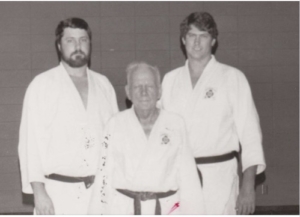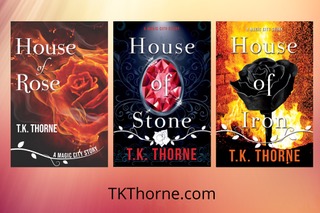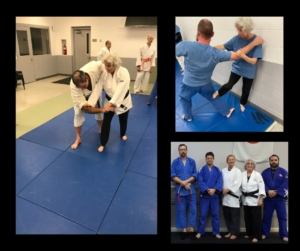The Art of Defense
In addition to being a writer, I am a few other things, at least one of which sometimes surprises people.
When I was a rookie at the Birmingham Police Academy (many years ago) my Physical Training instructor was a short, 71 year-old man. Despite his age and stature, Mr. Alex Marshall was more than a match for any police officer on the force, often to their chagrin. He took a liking to me and suggested that I study Aikido outside of the police academy to counter the disadvantage of my gender and stature (or lack thereof).
I loved the training . . . for reasons I never thought to articulate and even married my Aikido instructor (husband #2)! But when that divorce happened, I stepped away from the martial arts for a long time. The year after I retired, I found a new dojo (school) that was founded by Mr. Marshall and started learning a system that was familiar (as Mr. Marshall incorporated a great deal of Aikido in addition to Judo and Ju-jitsu).

Mr. Alex Marshal with my current Akayama Ryu teachers—Mark Barlow and Richard Worthington
Why did I go back after thirty years? Why do I still train in my late sixties? Of course, as a writer it is helpful to pull on what I know about fighting to make action scenes realistic. And its really fun to let a character do techniques that I will probably never have an opportunity to do. But there are deeper things that draw me to the mat for two hours twice a week.
Focus: When I attend class, the world and whatever thoughts or worries I might have fade away. There is only room in my head for what I am doing. This is a form of meditation, even though it is active, resulting in a refresh and reset. I always have more energy when I leave class than when I entered.
Learning: Like all art, learning is ongoing. Learning evokes joy and wonder. Learning is play. It is what we do as children as naturally as breathing.
Teaching: Helping others achieve gives me deep satisfaction.
Self-confidence: Rose—the police-witch in my urban fantasy trilogy (HOUSE OF ROSE, HOUSE OF STONE, and HOUSE OF IRON) also studies martial arts. She observes: “It’s not about being a badass or thinking I can handle every situation that might arise, but the training has somehow restored some of the confidence I took for granted before . . . . I think it’s rewiring my brain to overwrite the role of victim.”

Studying martial arts instills a certain kind of confidence—a trust in the body and subconscious that allows one to enter a state where the conscious mind stills, and training takes over. In the movie, The Last Samurai, Tom Cruise played an American who studies Japanese sword fighting. He has studied hard but keeps losing to his trainer until instructed to have “no mind.” When he gives up trying to figure out what to do to counter the sword moves and just allows his body and instincts to react, he is able to match his teacher. (Of course, in a movie where the director only has at best a couple of hours, this happens quickly; in reality it takes a “bit” more time. 🙂

The mind (consciousness) is not separate from the body. It is an organ whose importance rises or falls depending on what is required. There are times when it is important to engage mind, and there are times when it is best to let go of mind, as we do for critical functions like breathing and heart rate and the thousands of other tasks done without our conscious oversight.
Create: A musician strives for a place where the notes are so ingrained, the fingers do without direction and the player is free to devote energy to the emotional interpretation of the music.
For a visual artist, the paint can seem to act on its own to express the painter’s deep intent.
When I am writing in the “flow,” the words come from a deeper place than conscious mind. Once they are written, I engage critical thinking to edit, but even then, a better phrase often emerges from the deep mind or subconscious. I don’t know “where” it came from, any more than I know how my body regulates my heartbeat. A skilled writer knows when to let the conscious mind still and when to engage it.
Like a ballet dancer’s perfectly executed pirouette, reacting with “no mind” to engage and redirect the energy of an attacker can create a moment of beauty and harmony that reflects something universal and profound. I will be on the mat, I think, until I can no longer stand . . . and then maybe I’ll get a chair and watch.
![]()
T.K.Thorne is a retired police captain who writes Books, which, like this blog, go wherever her curiosity and imagination take her.
